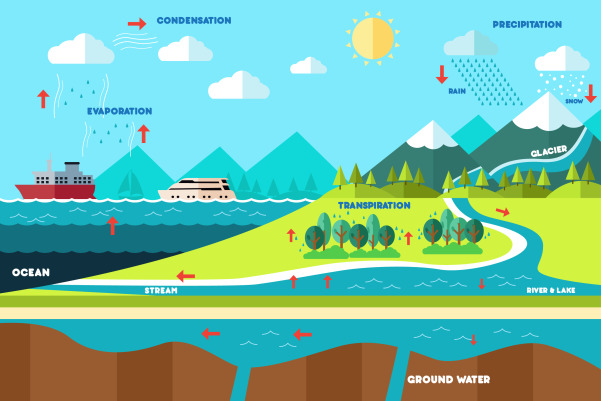Ahmedabad
(Head Office)Address : 506, 3rd EYE THREE (III), Opp. Induben Khakhrawala, Girish Cold Drink Cross Road, CG Road, Navrangpura, Ahmedabad, 380009.
Mobile : 8469231587 / 9586028957
Telephone : 079-40098991
E-mail: dics.upsc@gmail.com

World’s Water Cycle
News: As per World Meteorological Organization (WMO’s) State of Global Water Resources 2022 report, the ongoing melting of snow, ice and glaciers compounded the threat, exacerbating the risk of extreme weather events such as floods.
Key Findings:
• According to WMO, the circulation of water in the Earth-Atmosphere system has been significantly impacted by climate change and human activities. The effect on the hydrological cycle is leading to droughts and extreme rainfall events and the erratic water cycles unleashed widespread disruption, burdening livelihoods and economies.
• The report highlighted, the Asian Water Tower (AWT), the world’s largest reservoir of ice and snow after the Arctic and Antarctic regions which saw significant glacial melting in 2022. These alterations impacts the natural downward flow of major rivers — the Indus, Amu Darya, Yangtze and Yellow River in the region.
• The increasing pace of glacial melting in AWT, which provides a reliable water supply to almost two billion people, highlighted the deepening influence of climate change on regional water resources.
• Report emphasized SDG 13 (climate adaptation) by focusing on climate-related impacts on water systems and calling for mitigation actions.
What is Hydrological cycle?
• The hydrological cycle, also known as the water cycle, is a biogeochemical cycle that describes the continuous movement of water on, above, and below the surface of the Earth.
• The cycle involves several key processes such as Evaporation, Condensation, Precipitation, Interception, Infiltration, Percolation, Transpiration, Storage, Runoff.
What are the factors affecting hydrological cycle?
• Climate – Including Temperature and Precipitation
• Vegetation - Vegetation stores and impedes water from reaching the surface. It can absorb and store water which in turn can be transpired contributing to condensation and therefore rain which is supplied to the basin again.
• Rock Type/Soil Type - The type of rock or soil can also impact the hydrological cycle. Impermeable and pervious rock such as granite does not store water. Conversely, porous rocks such as limestone are easily filled with water thus encourage groundwater storages. Soils such as sand have large pore spaces and can store water compared to cohesive clay
• Human Impact - Human activities like deforestation and urbanization can significantly impact the hydrological cycle. For instance, deforestation can lead to less transpiration and therefore less condensation and rainfall. Urbanization can lead to increased runoff and decreased infiltration.
• Land Use/Land Cover - The land use/land cover (LU/LC) is one of the most influential factors affecting the hydrological cycle. Changes in LU/LC can impact several components of the hydrological cycle.

Address : 506, 3rd EYE THREE (III), Opp. Induben Khakhrawala, Girish Cold Drink Cross Road, CG Road, Navrangpura, Ahmedabad, 380009.
Mobile : 8469231587 / 9586028957
Telephone : 079-40098991
E-mail: dics.upsc@gmail.com
Address: A-306, The Landmark, Urjanagar-1, Opp. Spicy Street, Kudasan – Por Road, Kudasan, Gandhinagar – 382421
Mobile : 9723832444 / 9723932444
E-mail: dics.gnagar@gmail.com
Address: 2nd Floor, 9 Shivali Society, L&T Circle, opp. Ratri Bazar, Karelibaugh, Vadodara, 390018
Mobile : 9725692037 / 9725692054
E-mail: dics.vadodara@gmail.com
Address: 403, Raj Victoria, Opp. Pal Walkway, Near Galaxy Circle, Pal, Surat-394510
Mobile : 8401031583 / 8401031587
E-mail: dics.surat@gmail.com
Address: 303,305 K 158 Complex Above Magson, Sindhubhavan Road Ahmedabad-380059
Mobile : 9974751177 / 8469231587
E-mail: dicssbr@gmail.com
Address: 57/17, 2nd Floor, Old Rajinder Nagar Market, Bada Bazaar Marg, Delhi-60
Mobile : 9104830862 / 9104830865
E-mail: dics.newdelhi@gmail.com